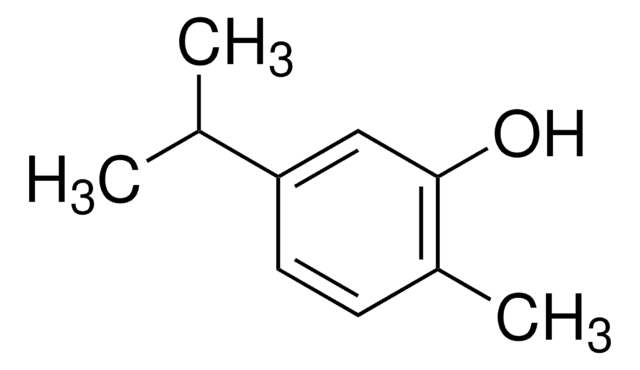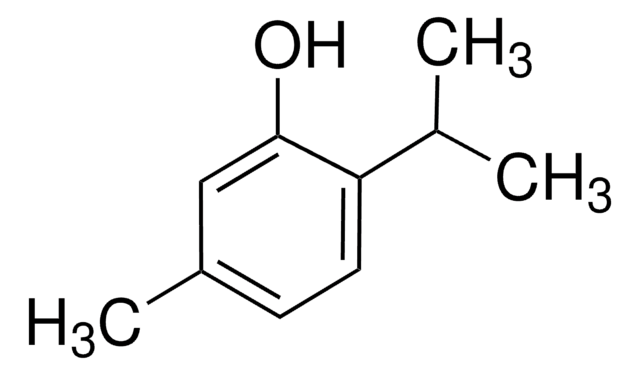추천 제품
생물학적 소스
Thymus vulgaris and/or Thymus zygis oil
Grade
FG
Fragrance grade
Halal
Kosher
Agency
follows IFRA guidelines
규정 준수
EU Regulation 1223/2009
EU Regulation 1334/2008 & 872/2012
FDA 21 CFR 182.2
광학 활성
[α]20/D −1°, neat
기원
France origin
refractive index
n20/D 1.502
bp
195 °C
density
0.917 g/mL at 25 °C
응용 분야
flavors and fragrances
문건
see Safety & Documentation for available documents
식품 알레르기항원
no known allergens
향수 알레르기항원
linalool, citral (neral+geranial), limonene (sum of D, L and DL), geraniol, α-pinene and β-pinene
감각 수용성의
herbaceous; camphoraceous
유사한 제품을 찾으십니까? 방문 제품 비교 안내
관련 카테고리
일반 설명
Natural occurrence: Thyme.
애플리케이션
- Obliteration of H. pylori infection through the development of a novel thyme oil laden nanoporous gastric floating microsponge.: This study presents an innovative application of thyme oil encapsulated within nanoporous microsponges designed to target and eradicate Helicobacter pylori in the stomach, demonstrating the potential of natural compounds in medical applications (Jafar et al., 2024).
- Experimental trials to assess the immune modulatory influence of thyme and ginseng oil on NDV-vaccinated broiler chickens.: This research evaluates the immunomodulatory effects of thyme oil on vaccinated poultry, suggesting its utility in enhancing immune responses in agricultural practices (Hassanin et al., 2024).
- Antimicrobial polysaccharide hydrogels embedded with methyl-β-cyclodextrin/thyme oil inclusion complexes for exceptional mechanical performance and chilled chicken breast preservation.: Highlights the development of polysaccharide-based hydrogels incorporating thyme oil for food preservation, showcasing its antibacterial properties and potential for extending the shelf life of perishable goods (Chen et al., 2024).
- Corn cob nanocellulose packaging for increasing the shelf life of food products.: Investigates the role of thyme oil in biodegradable packaging solutions, enhancing the antimicrobial properties of corn cob nanocellulose composites, which could revolutionize sustainable packaging technologies (Cheran et al., 2024).
- Evaluation of the effectiveness of natural extract as a substituent for synthetic preservatives and antioxidants in pharmaceutical preparations.: Examines thyme oil′s efficacy as a natural preservative in pharmaceutical products, promoting its application as a safer alternative to synthetic additives (Al-Rimawi et al., 2024).
생화학적/생리학적 작용
Taste at 50 ppm
신호어
Danger
유해 및 위험 성명서
Hazard Classifications
Flam. Liq. 3 - Skin Corr. 1B
Storage Class Code
3 - Flammable liquids
WGK
WGK 2
Flash Point (°F)
140.0 °F - closed cup
Flash Point (°C)
60 °C - closed cup
개인 보호 장비
Faceshields, Gloves, Goggles, type ABEK (EN14387) respirator filter
Jelica Lazarević et al.
Insects, 11(9) (2020-08-28)
The bean weevil Acanthoscelides obtectus Say (Coleoptera: Chrysomelidae: Bruchinae) can cause significant losses in production of its primary host common bean Phaseolus vulgaris L. To avoid bean protection with environmentally risky chemical insecticides and provide sustainable and safe production of
Siqi Li et al.
Food chemistry, 339, 128016-128016 (2020-11-07)
The aim of this study was to develop a thyme oil emulsion with good physicochemical properties and antibacterial activity. Initially, oil-in-water emulsions containing whey protein-coated essential oil droplets were prepared by high-pressure homogenization. The double-layer emulsions were formed around the
Jia Xue et al.
International journal of food microbiology, 210, 1-8 (2015-06-18)
Emulsions of essential oils are investigated as potential intervention strategies to improve food safety and are preferably prepared from generally-recognized-as-safe emulsifiers. Stable thyme oil nanoemulsions can be prepared using combinations of sodium caseinate (NaCas) and soy lecithin. The objective of
L L Dunn et al.
Journal of food protection, 82(1), 159-163 (2019-02-01)
Alternative postharvest sanitizers to chlorine are of increasing interest for many organic growers and consumers. An emulsion of clove bud oil (CBO; 0.2 and 0.5%) or thyme oil (0.2 and 0.5%) was evaluated as a sanitizer for produce washing against
Victor Ryu et al.
Food chemistry, 245, 104-111 (2017-12-31)
The objective of this research was to study the impact of ripening inhibitor level and type on the formation, stability, and activity of antimicrobial thyme oil nanoemulsions formed by spontaneous emulsification. Oil-in-water antimicrobial nanoemulsions (10 wt%) were formed by titrating a
자사의 과학자팀은 생명 과학, 재료 과학, 화학 합성, 크로마토그래피, 분석 및 기타 많은 영역을 포함한 모든 과학 분야에 경험이 있습니다..
고객지원팀으로 연락바랍니다.





